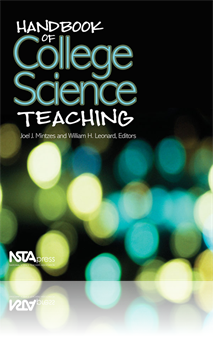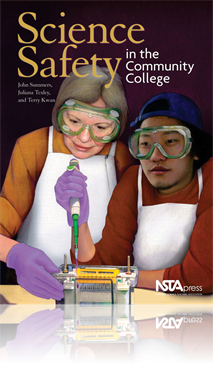All Resources
Book Chapter
Using Research on Teaching to Improve Student Learning
This chapter describes general procedures for research on college and university science teaching, examples and benefits of several very different res...
Book Chapter
Experiential Learning in a Large Introductory Biology Course
This chapter describes and discusses effective approaches to teaching a large, two-semester introductory college biology course at Syracuse University...
Book Chapter
Strategies for Interactive Engagement in Large Lecture Science Survey Classes
This chapter describes some things that faculty in large-enrollment introductory astronomy courses do to intellectually engage students in learning th...
Book Chapter
Undergraduate Research in Science: Not Just for Scientists Anymore
Institutional measures, such as the fraction of undergraduate research (UR) students who later pursue a PhD in science, do not reflect the value of UR...
Book Chapter
Concept Mapping in College Science
A concept map is a two-dimensional, hierarchical node-link diagram that depicts the most important concepts and propositions in a knowledge domain. Co...
Book Chapter
Peer Instruction: Making Science Engaging
Peer Instruction (PI) is an interactive approach that was designed to improve the learning process. This approach provides students with greater oppor...
Book Chapter
Open Laboratories in College Science
One viable alternative to the conventional, regularly scheduled laboratory session is the open laboratory concept. In this chapter, the authors use th...
Book Chapter
Setting the Scene: Safer Science in a Drive-Through Learning Community
Developing a responsible and safe introductory community college laboratory science program is a challenge. The subject matter is complex, requiring c...
Book Chapter
The Kitchen Sink: A Potpourri of Teaching Tips
The 21st century has brought new technology as well as new concerns. After covering traditional safety categories in previous chapters, this chapter d...
Book Chapter
Live Long and Prosper: And Remember You Are Responsible
Today's society is quite litigious, and many people place blame on instructors for factors well beyond the instructors' control. This chapter shares t...
Book Chapter
Communities of Learners: Promoting Science for Every Citizen
This chapter looks at ways to accommodate diverse needs and goals—not only to make a program safer but also to help everyone involved achieve the go...
Book Chapter
Where Science Happens: Equip Your Lab for Safety
Many college buildings are aging and with increases in enrollment, some administrators are forced to use stopgap scheduling or emergency housing. This...
Book Chapter
Finders Keepers: Essentials of Safer Storage
More than any other community college instructional disciplines, laboratory sciences require safe and secure storage facilities. This includes storage...
Book Chapter
Lively Science: Living Organisms and More
Most life science laboratories are filled with chemicals and electronics. Observing and studying living organisms is critical to a strong program, but...
Book Chapter
Modern Alchemy: Safer Teaching With Chemistry
Today more students take chemistry at the secondary level than a decade ago, but community college instructors must not assume that these students com...



